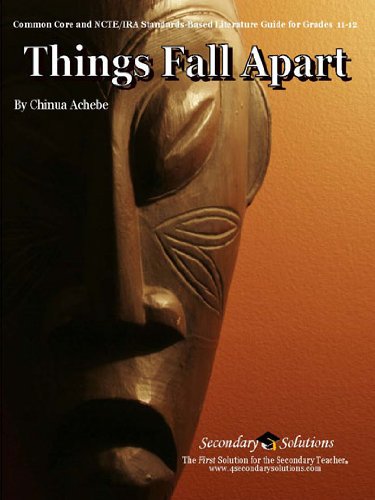Things fall Apart by Chinua Achebe
Introduction:-
Things fall Apart
(1958) is one of the most widely read and studied African novels ever
written. The novel focuses on Okonkwo, an ambitious and inflexible
clan member trying to overcome the legacy of his weak father. The
clan does not judge a man on their s status is based on his own
achievents. He is a great wrestler, a brave warrior, and a respected
member of the clan who endeavors to uphold its tradition of his
ancestors and their ways. One of the issues that critics have
continued to discuss is whether Okonkwo serves as an embodiment of
the values as an embodiment of the values of Umuofia or stands in
conflict with them. This discussion often centers around the question
of Okonkwo’s culpability in the killing of the boy, lkemefuna.
Summery:-
The novel follows
the life of a Nigerian man, Okonkwo. Okonkwo lives in a group of nine
villages. The villages are ruled by a council of elders. Okonkwo is
one of the respected leaders of his village. He is also a wrestling
champion. Both his wrestling and his leadership role are driven by
his shame about his father, who left a lot of debts unpaid when he
died, and who Okonkwo viewed as too feminine.
When a man from a
neighboring village kills one of the women from Okonkwo's village, a
peace settlement requires the son of the man who killed the woman to
come live in Okonkwo's village. Okonkwo himself takes the boy in and
they develop a strong bond.
Unfortunately, a
decision is made to kill the boy. One of the village elders, Ezeudu,
warns Okonkwo not to assist with killing the boy. Determined not to
seem like a coward, especially because of his father's legacy,
Okonkwo kills the boy himself with a machete. The boy's death is like
a bad omen. After the boy dies, Okonkwo accidentally kills Ezeudu's
son. For his crime, the village determines he must spend seven years
in exile to appease the gods.
During his exile,
white missionaries arrive in the village. When Okonkwo finally
returns, the white men have thoroughly infiltrated his village.
Okonkwo helps destroy a Christian church, only to be arrested by the
white government.
Some of the
villagers, including Okonkwo, want to stage an uprising against the
village. He even kills one of the white men. After he does so, he
realizes that the other villages have changed too much. They will not
fight the white men off. Unable to live with his revelation, Okonkwo
kills himself. This is a very important moment in the novel because,
according to Okonkwo's traditional beliefs, suicide is not allowed.
Okonkwo's desperation about his changing village is staggering if it
can outweigh his strict adherence to the traditional ways.
At the end of the
novel, a white commissioner, upon learning about Okonkwo's rebellion
and suicide, notes that it will make an interesting paragraph in the
book he is writing about 'the pacification of the primitive tribes of
the lower Niger.'

No comments:
Post a Comment